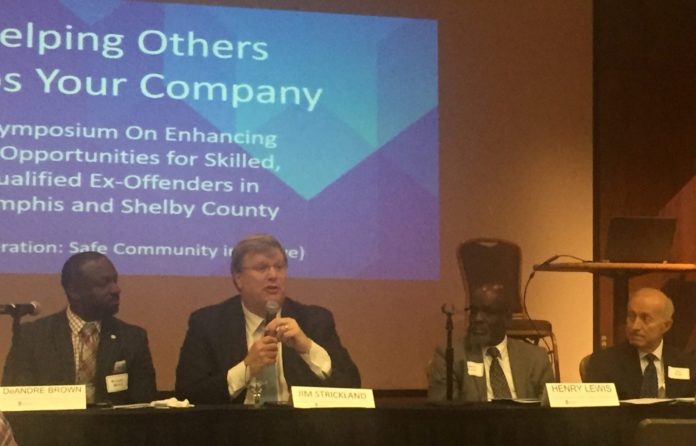We’ve all made mistakes and have been in need of second chances, right? Ex-offender Jerald Trotter feels the same way. He hasn’t been able to get a job after serving 13 years for a second-degree murder conviction in 2000.
Officials with the Tennessee Department of Correction (TDOC) know second-chancers such as Trotter face employment obstacles that can contribute to some landing back behind bars. In an effort to decrease the reincarceration rate they have implemented programs designed to help ex-offenders make themselves more employable.
OK, well great. Then what’s the problem here?
Many job applications ask about felony convictions, with employers often making their choices based upon the answer. Check yes and an applicant often is disqualified, even if she/he is skilled and qualified.
Last Thursday, I attended the “Helping Others Helps Your Company Symposium” at the U of M Fogelman Executive Conference Center. TDOC and the Public Safety Institute (PSI) collaborated to assure employers and job developers that many ex-offenders are trained and skilled workers in need of a second chance. They were told that by helping those in need of second chances they would be helping their company, the community and themselves.
More than 50 prospective employers and job developers attended the symposium. During the course of discussion, many spoke of the uncertainties they have when it comes to hiring ex-offenders – lack of transportation, housing, reliable contact information and soft skills such as communication, timeliness and an ability to get along well with others.
Lowering the reincarceration rate was linked to the need for a shift in such mindsets.
Shelby County Mayor Mark H. Luttrell Jr. moderated the first of two panel discussions. The focus was on preparing ex-offenders to live more productive lives.
“While incarcerated, we have over 90 percent of our inmates that have jobs,” said April Buckner, the correctional administrator for West Tennessee and chair of the symposium. “These job opportunities drive their personal portfolios so when they come out they are skilled and ready to work.
“We’re not just putting anybody off on employers. These individuals know how to walk, how to talk and they have made themselves stronger in the employment market.”
TDOC re-entry planning starts at conviction, no matter the sentence. The goal is to ensure each inmate is offered the opportunity to address the behavior that brought them into custody and the behavior needed to change their lives for the better.
Patricia Melton, manager of Grants, Education, & Vocational Services for the Shelby County Division of Corrections, detailed Hope2Hire, describing it as “a prison-based program that works towards building a stronger community together through hands-on job training and life skills development for the prison population of Memphis.”
Mayor Jim Strickland led a conversation about sources of skilled and qualified workers.
“There are approximately 15,000 job vacancies in the greater Memphis area, with about 9,000 paying $12 or more per hour,” he said.
Panelist Ron Wade, executive director of Hope Works, shared the purpose of his organization and how ex-offenders are equipped for employment.
“We offer ex-offenders support and accountability in the early stages of employment. We train workers that have proven their internal motivation and we educate our workers to understand employer’s expectations and how to communicate with supervisors and customers,” Wade said.
“All of our graduates are drug free, more self-aware, competent and ready for a chance to prove themselves and have a support system to coach and guide them.”
DeAndre Brown, chief executive officer of Lifeline to Success and a convicted felon, said Lifeline enrolls, trains and employs 41 ex-offenders, providing them with a place to be heard and a place to learn.
“We are not just a job placement program for convicted felons, but a life transformation program,” he said.
Taurean James, superintendent at the Mark Luttrell Transitional Center, detailed a three-phase program that focuses on cognitive and behavioral care, education and job skills.
Burn Phillips, Tennessee Department of Labor and Workforce Development Commissioner, told employers that another incentive for hiring ex-offenders is receiving a tax break through the Work Opportunity Tax Credit Program.
“For each felon hired, a business can earn up to $2,400 in tax credit. Statewide our department issued $361 million dollars in tax credit last year.”
A master mechanic and business owner, Gerald Stewart detailed his success story with hiring an ex-offender.
“Good help is truly hard to find. After what seemed to be a never-ending search for reliable employees, I met an employee at the Mark Luttrell Transitional Center that invited me to the prison to speak to inmates, but also sent some of the best employees I’ve ever had,” Stewart said. I mean these guys show up to the shop on time, everyday, sometimes they are here before me. They are hard workers and teachable.”
Sure, he was skeptical at first, “but they just want to work and prove themselves and I’ll take that over a lazy mechanic any day.”
Employers also met Chris, an ex-offender now employed through HopeWorks.
“I’m just thankful for this opportunity,” Chris said. “I can get up and drive to work; that’s a good feeling.”




